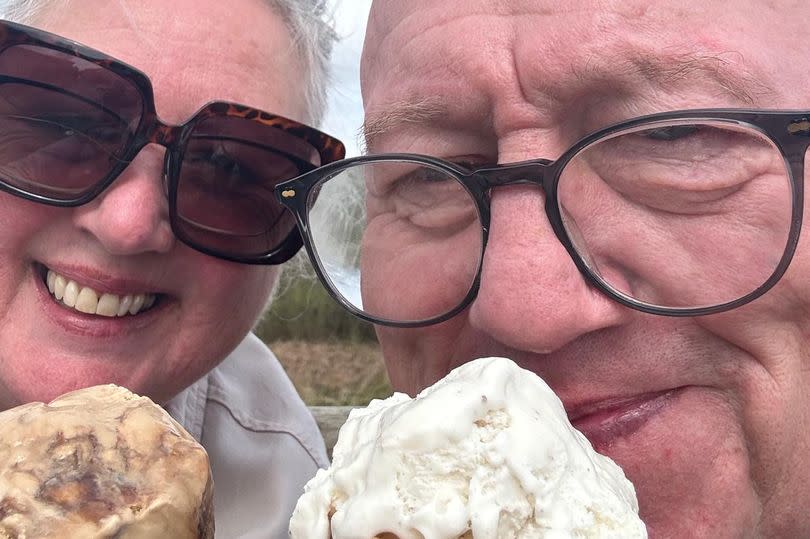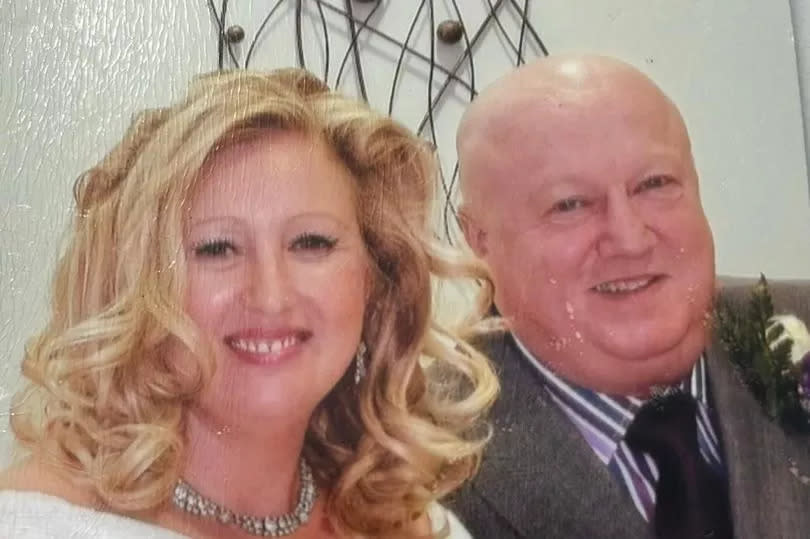'Doctors thought I was depressed but scans revealed a life-changing diagnosis'

Geraint Roberts was working as a teaching assistant in a secondary school when his pupils started to finish his sentences. He thought very little of it at the time.
It was just before Covid and it ddn't strike him as anything at the time. But other symptoms started to appear. First of all it was put down to sleep apnoea and then he was given a diagnosis of depression.
When the lockdown happened Geraint and his wife Alison were, like everyone, stuck at home in Caerphilly together 24/7 for the first time in their lives and that is when she started to pick-up on other things too. "I started to notice that there were behavioural changes," she said.
READ MORE: ‘I struggled to tie my shoelaces before Michael Mosley diet turned me into a fat-burning machine’
READ MORE: 'I've lived with chronic pain for years but one diet has changed everything'
Alison said Geraint was "acting out of character" and that he was tired and forgetful. She said: "In the beginning you think it is like a relationship problem. But then it suddenly struck me: 'There's something wrong here. This isn't quite right.' So it took me quite a while because I was thinking: 'It is a bad time, it's Covid'. We were all having a bad time.
"But I thought: 'There is something not right here' so we were trying to get to the bottom of it during a time where we couldn't go to the doctors. But I think you know there is something not right, there is something going on."
Geraint said he was in a band at the time, playing the drums but he struggled to stay coordinated. He said: "I was falling over the drum kit. I was playing and losing the tempo. So it came to a head and I said: 'Look boys, I have to get out of this.'"
Alison said it was a lot of back and forth to the doctors and Geraint was referred to the memory clinic twice but was told he was "too young." But the third referral resulted in an MRI and cat scan.
"And when that was done they could see," Alison said. Geraint was diagnosed with logopenic aphasia, the same type of dementia that Bruce Willis was diagnosed with, at the age of 62 and it is described as young-onset dementia.

The actual diagnosis took two years to get from the point of symptoms first developing. But Alison explained that from the point of diagnosis it felt like they could both move forward.
Upon hearing the diagnosis Geraint said he was "absolutely gutted". Alison was called to meet Geraint at the hospital where the doctor told them the brutal reality of what it meant. She said: "[The doctor] didn't sugarcoat it. He said: 'You are going to get worse, not better'. And it was quite a shock. By the time I got there he said: 'Make sure your will is in order and start applying for power of attorney.' That was all on the same day and it was quite a bombshell really."
Geraint, now 66, takes medication which slows down the progress of his condition and initially saw some improvement before it plateaued. But the diagnosis allowed the couple to make plans and move on and Geraint has found a new lease of life through participating in groups organised by the Alzheimer's Society.
He attends weekly groups called Singing for the Brain, as well as music and memory groups, and said he is the youngest in the group. Geraint admitted it was such a shock to be given a dementia diagnosis at such a young age but has found comfort in attending the groups and learning from others who share a similar diagnosis to him.
The couple have had to adapt a lot of their life following Geraint's diagnosis but they still try to enjoy doing things together like going to the pub and socialising and going to listen to music. They are sharing their story this dementia action week to raise awareness of the signs and symptoms and to also signpost people to the support that is out there. For the latest health and Covid news sign up to our newsletter here.
Laura Courtney, Alzheimer’s Society national influencing manager, said: “One in three people born today will develop dementia. It’s the biggest health and social care issue of our time yet it isn’t the priority it should be amongst decision-makers. We wouldn’t accept this for any other terminal disease; we shouldn’t accept this for dementia.
“It is estimated that one in two people living with dementia in Wales do not have a diagnosis. They are facing dementia alone without access the vital care, support, and treatments. If we don’t address diagnosis we have no hope of addressing the major dementia challenges we face and reducing the cost to the health service and wider economy.
“Dementia’s devastating impact is colossal – on the lives of those it affects, on the healthcare system, and on the economy. Now is the time to prioritise dementia and that starts with getting more people diagnosed.”
If you’re worried about yourself or someone close to you then check your symptoms today using Alzheimer’s Society’s symptom checklist. Visit alzheimers.org.uk or call their dementia support line on 0333 150 3456. If you speak Welsh call the Welsh-speaking support line on 03300 947 400.

 Yahoo News
Yahoo News 
